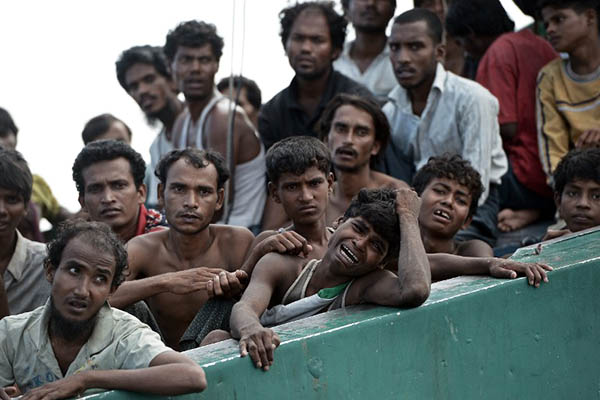
File Photo. Christophe Archambault—AFP
United Nations report says South Asian country’s campaign may amount to ethnic cleansing.
Myanmar’s military crackdown on Rohingya Muslims has likely killed hundreds of people, with children slaughtered and women gang-raped in a campaign that may amount to ethnic cleansing, the U.N. said on Friday.
Soldiers have fired on civilians from helicopters while bands of troops have gone door-to-door in northern Rakhine state, terrorizing Rohingya and torching their homes, according to a report from the United Nations human rights office.
It was “very likely” that crimes against humanity have been committed in Myanmar, said the report, echoing previous U.N. accusations. Rights office researchers interviewed 204 Rohingya refugees in Bangladesh, where nearly 70,000 people have fled during the four-month crisis.
The Rohingya Muslims are loathed by many among Myanmar’s Buddhist majority and have faced persecution for years.
Violence has surged since the Oct. 9 attacks on border guard posts that Myanmar and independent experts say was carried out by foreign-backed militants.
Myanmar’s military launched “area clearance operations” the next day, which the U.N. report said “have likely resulted in several hundred deaths.”
Myanmar’s government spokesman Zaw Htay called the allegations “extremely serious” and said an existing Rohingya-focused commission led by Vice President U Myint Swe would investigate the U.N. claims.
While anti-Rohingya unrest has flared in the past, notably in 2012, a U.N. investigator who traveled to Bangladesh, Ilona Alexander, told reporters in Geneva that the current level of violence was “unprecedented.”
“An eight-month-old baby was reportedly killed while his mother was gang-raped by five security officers,” the rights office said in a statement, citing witnesses.
Three children aged six or younger were “slaughtered with knives” and a five-year-old girl’s throat was cut after she tried to protect her mother from rape, according to the report.
The U.N. said the alleged atrocities in Rakhine had been committed by the security services and armed civilians collaborating with the military and police. But the most gruesome accusations, including rape and other sexual violence, were made against the army, U.N. investigators said.
“What kind of hatred could make a man stab a baby crying out for his mother’s milk,” U.N. rights chief Zeid bin Ra’ad Zeid al-Hussein said in a statement.
A full 47 percent of those interviewed by the U.N. said they had a family member who had been killed in the operation, while 43 percent reported being raped. “Now is the worst it has ever been,” the report quoted on unnamed witness as saying.
Rights office spokeswoman Ravina Shamdasani told reporters in Geneva that “the kind of systematic and widespread violations that we have documented could be described as ethnic cleansing,” but noted that was not a legally defined offence provable in court.
Myanmar refuses to recognize the Rohingya as one of the country’s ethnic minorities, instead describing them as Bengalis—or illegal immigrants from neighboring Bangladesh—even though many have lived in Myanmar for generations.
Witnesses told the U.N. they had been taunted while they were beaten and mocked over the failure of “Allah” to help.
Myanmar’s probe led by the vice president has denied that the security forces had carried out a genocidal campaign against the Rohingya. The government, led by Nobel laureate Aung San Suu Kyi, has said the allegations are invented and has resisted mounting international pressure to protect the minority.
But the U.N.’s Zeid, who has previously urged Myanmar to act, hit back again on Friday demanding that impunity for such serious crimes had to stop. “The Government of Myanmar must immediately halt these grave human rights violations against its own people, instead of continuing to deny they have occurred,” he said.
